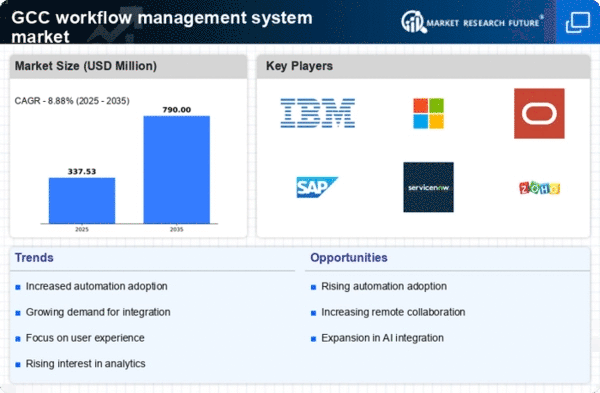Shift Towards Remote Work Solutions
The shift towards remote work is reshaping the landscape of the workflow management-system market. As organizations in the GCC adapt to flexible work arrangements, there is a growing need for systems that support collaboration and communication among distributed teams. Workflow management systems that offer cloud-based functionalities are particularly appealing, as they enable seamless access to information and task management from any location. This trend is likely to drive market growth, with forecasts suggesting an increase in adoption rates by over 40% in the next few years. Companies are recognizing that effective remote work solutions are essential for maintaining productivity and employee engagement.
Focus on Data-Driven Decision Making
The emphasis on data-driven decision making is significantly impacting the workflow management-system market. Organizations in the GCC are increasingly leveraging data analytics to inform their operational strategies. Workflow management systems that provide insights into process performance, resource allocation, and employee productivity are becoming essential tools for management. By utilizing these systems, companies can make informed decisions that enhance efficiency and drive growth. The market is witnessing a shift towards solutions that offer advanced analytics capabilities, with a projected increase in demand for data-centric workflow systems by approximately 20% over the next few years.
Regulatory Compliance and Governance
Regulatory compliance is a significant driver influencing the workflow management-system market. In the GCC, businesses are increasingly required to adhere to stringent regulations and governance standards. Workflow management systems facilitate compliance by automating documentation, tracking changes, and ensuring that processes align with legal requirements. This capability is particularly crucial in sectors such as finance and healthcare, where non-compliance can result in hefty fines. The market is expected to see a rise in demand for solutions that offer robust compliance features, as organizations prioritize risk management and regulatory adherence in their operational strategies.
Integration with Emerging Technologies
Integration with emerging technologies is becoming a pivotal driver for the workflow management-system market. The incorporation of artificial intelligence (AI), machine learning (ML), and the Internet of Things (IoT) into workflow systems is enhancing their capabilities. These technologies enable organizations to automate complex tasks, analyze data in real-time, and improve decision-making processes. In the GCC, the market for AI in workflow management is projected to grow at a CAGR of 25% over the next five years. This integration not only boosts efficiency but also provides a competitive edge, making it a critical factor for businesses looking to optimize their operations.
Rising Demand for Operational Efficiency
The workflow management system market is experiencing a notable surge in demand for operational efficiency across various sectors in the GCC. Organizations are increasingly recognizing the need to streamline processes, reduce redundancies, and enhance productivity. This trend is driven by the desire to minimize operational costs, which can lead to significant savings. According to recent data, companies that implement effective workflow management systems can achieve up to 30% improvement in process efficiency. As businesses strive to remain competitive, the adoption of these systems is likely to continue growing, indicating a robust market potential for vendors in the workflow management-system market.
















